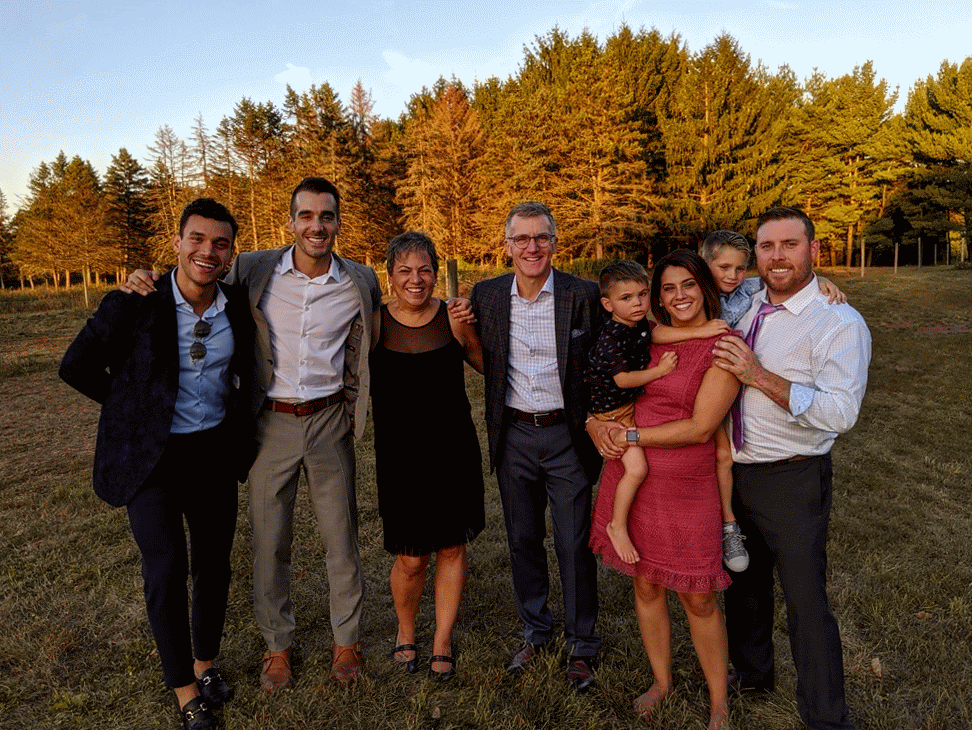When lab tests confirmed that her non-Hodgkin lymphoma (NHL) had recurred after treatment, Ann Bonetti came to Dana-Farber expecting to hear she would need a stem cell transplant. When her oncologist told her about a clinical trial of a treatment that would turn her body’s own T cells into ace cancer fighters, she didn’t need to be talked into signing up.
The trial, dubbed ZUMA-7, randomly assigned patients to receive either a stem cell transplant or a CAR T-cell therapy called axi-cel. Bonetti, as she’d hoped, was assigned to the CAR T-cell group. Her participation in the trial has not only benefited her personally — almost four years after treatment, she is cancer-free with no side effects — but also was critical to the process that led to the Food and Drug Administration’s recent approval of the therapy, marketed as Yescarta, for patients with large B-cell lymphoma that didn’t respond to or relapsed after initial treatment.
“Patients with high-risk early relapsing diffuse large B-cell lymphoma benefit less from an autologous stem cell transplant than patients who relapse later. Before this study, these patients needed to go through chemotherapy that was unlikely to work in order to qualify for CAR T cells in a later line of therapy,” says Bonetti’s oncologist, Caron Jacobson, MD, MMSc, medical director of the Immune Cell Therapy Program at Dana-Farber. “Now, with the positive results of this study and the expanded FDA approval, these patients can go straight to CAR T-cell therapy, avoiding chemotherapy toxicities and deriving benefit much earlier.”
For Bonetti, the trial opened the possibility of a new therapy, which she was intrigued by, rather than the standard treatment, a transplant, which she felt some trepidation about. “I had a friend who’d undergone a transplant, and though it went well — and she’s doing great today — it had been a difficult experience,” Bonetti says. “CAR T was something new and innovative.”
[Learn more about CAR T-cell therapy.]

Finding an option after recurrence
A former elementary school teacher, Bonetti lives in Rhode Island with her husband. The mother and grandmother of two was diagnosed with large B-cell lymphoma, the most common form of NHL, in early 2017. She underwent six rounds of combination chemotherapy and was in remission by summer.
By mid-2018, the cancer was back. Her oncologist told her she’d need a stem cell transplant and referred her to Dana-Farber. She met Jacobson, who she calls “my angel on earth,” in May and learned about the clinical trial of axi-cel.
Like other CAR T-cell therapies, axi-cel involves collecting millions of a patient’s immune system T cells and genetically arming them to better recognize and attack cancer cells. The manufacturing process generally takes two or three weeks before being infused into the patient.
Bonetti had her T cells extracted in June 2018 and entered Brigham and Women’s Hospital a few weeks later for the re-infusion. She felt fine for the first week, before experiencing some common, temporary side effects of the treatment — fevers, difficulty speaking, memory lapses.
These effects, caused by the intensity of immune response triggered by the CAR T cells, subsided after a few days. Knowing that these symptoms were likely to occur, Bonetti had taken her son’s advice and written notes to herself about what to expect: “that I might not be able to speak and might not recognize people. It’s frightening, but it won’t last.” Unsettling as this period was, Bonetti says “it’s a small price to pay for a treatment that has worked so well.”
After being discharged from the hospital, Bonetti gradually regained her strength and stamina and today, nearly three years later, receives no further treatment. “When I came back for a check-up a few weeks after my treatment, Dr. Jacobson showed me before-and-after CAT scans of my body,” she says. “Before treatment, there were signs of cancer all over. After, there were none.
“There’s so much to be grateful for,” she continues. “I’m so thankful for my doctors and caregivers, and the researchers who developed CAR T.”
